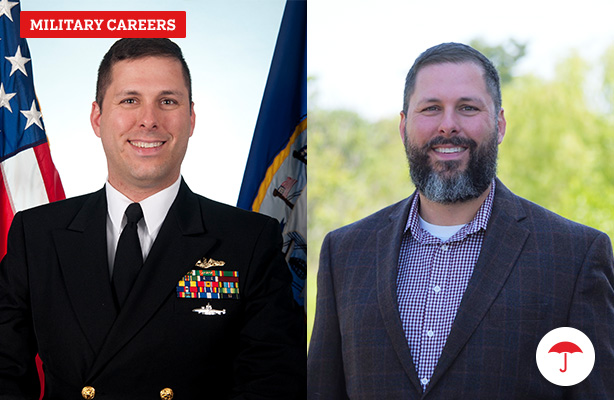Christian Beisel: From the U.S. Navy to Travelers Risk Control
 Travelers is home to more than 1,000 veterans and former service members in various roles directly related to the skills and knowledge gained during their military careers.
Travelers is home to more than 1,000 veterans and former service members in various roles directly related to the skills and knowledge gained during their military careers.
Veterans like Christian Beisel, whose experience in the U.S. Navy Naval Nuclear Propulsion Program eventually led him to a civilian career as a Forensic Specialist and Boiler Liaison in Travelers Risk Control.
Read on to hear how the skills Christian acquired in the Navy have helped him in his roles at Travelers and how his military experience and values align with our workplace culture.
Describe your current role at Travelers and your career journey at Travelers.
“I am a Forensic Specialist and Boiler Liaison at the Risk Control Lab. I shifted to this role in March 2023 from my previous role as the Northeast Field Manager for Boiler and Machinery Risk Control.”
Describe some of your team’s roles and work in Forensics in the Risk Control Lab.
“Forensic Engineering helps bring science to claims. We bring investigative support to better understand the facts of a claim and determine the “why.” The collaborative nature of working with claims and subrogation as an internal expert is appealing to me because it offers a new set of challenges and the ability to continue to learn and grow.
I am still amazed by the lab’s capabilities to provide large loss, investigative support to the Claim organization on behalf of our customers.”
What is your military and career background?
“I enlisted in the Navy as an Electronics Technician in the Naval Nuclear Propulsion Program in 1995 during my third semester at Virginia Tech. I went through the nuclear training pipeline and served as a Reactor Operator on USS Theodore Roosevelt (CVN-71) until I was selected for a commissioning program in 2000. I returned to Virginia Tech and was commissioned in 2003. I went back through the nuclear training pipeline and became a Submarine Warfare Officer, serving on USS Nevada (SSBN-733), USS Providence (SSN-719), and PCU Vermont (SSN-792). I also served on several shore tours, including as the Submarine Group 2 Engineer, the Naval Submarine School Navigator and Director of Pipeline Technical Training, Submarine Development Squadron Twelve Tactical Analysis Group, and the Executive Officer of Naval Submarine Base New London. I joined Travelers upon retiring from the Navy in 2019.”
Can you describe your transition into the civilian workforce? What ultimately led you to apply at Travelers?
“As I approached my retirement from the Navy, I decided to focus my search for a new career outside the defense industry. Headhunters were focused on opportunities outside of my geographic area, but my kids were in the same town and school for most of their childhood, and my wife and I had no desire to relocate. One of my friends I mountain bike with also worked for Travelers and suggested I look into Risk Control based on my background. I contacted the Director of Military Sourcing at Travelers, who connected me with Boiler and Machinery Risk Control, where I ultimately started my Travelers journey.”
What are some of the military skills that translate into your current role and the roles you have held?
“Some skills that translate from the military into my roles at Travelers include communication, collaboration and teamwork, critical thinking, decision-making, adaptability, resiliency, and the ability to learn. There are certainly technical and specific skills that translate as well. Still, my Navy career offered broad experience and developed me into a lifelong learner, which best translates into my current role.”
What is the overall workplace culture at Travelers?
“The overall workplace culture at Travelers is collaborative and focused on the customer and the team. It was a smooth transition because of the similarities between the Navy’s core values of Honor, Courage, and Commitment to our Travelers’ core values of Honesty, Integrity, and Accountability.
It was also important to me that Travelers demonstrated that in addition to claims, our customers, communities, and employees are also key stakeholders. Support towards charitable giving and volunteerism were also important aspects that paralleled the commitment to service that became a part of me in the Navy.
How does Travelers support the greater military community?
“Travelers supports partnerships and programs that provide a variety of outreach to veterans, transitioning service members and their families. Mentoring through American Corporate Partners (ACP) is one of the ways that I have been able to give back. I didn’t know about ACP when I was transitioning from the Navy. After more than a year of involvement with the program, I’ve found that mentoring servicemembers transitioning from the military to the private sector not only provides my mentees with support and advice through a pivotal part of their life but it allows me to better self-reflect on my own transition and what I value about my career at Travelers.”
What advice would you give transitioning or serving military members looking for civilian careers?
“Be confident in how your military experience translates to applicable skills. Be open to what opportunities are out there. Determine what’s most important to you and your family in a post-military career.”
What is your favorite part about working at Travelers?
“My favorite part about working at Travelers is the collaborative environment and working with a group of intelligent and dedicated professionals. Including our customers, communities, and employees as stakeholders bring a sense of pride in being a part of the organization. This was important to me as I transitioned from a career in the Navy.”
SUBSCRIBE TO GET OUR LATEST BLOGS
Want to stay up to date? Have stories sent directly to your email inbox.

